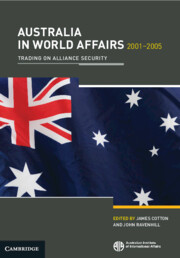Book contents
- Frontmatter
- Contents
- Illustrations
- Contributors
- Preface
- Abbreviations
- Part 1 The Foreign Policy Scene
- Part 2 Relationships
- Part 3 Issues
- Part 4 Foreign Policy in the Political Process
- 13 Neither Entirely Comfortable nor Wholly Relaxed: Public Opinion, Electoral Politics, and Foreign Policy
- 14 Parliament and Foreign Policy
- 15 After the Flood: Foreign Policy and the Management of Intelligence
- Survey Sources
- References
- Index
15 - After the Flood: Foreign Policy and the Management of Intelligence
from Part 4 - Foreign Policy in the Political Process
Published online by Cambridge University Press: 04 May 2024
- Frontmatter
- Contents
- Illustrations
- Contributors
- Preface
- Abbreviations
- Part 1 The Foreign Policy Scene
- Part 2 Relationships
- Part 3 Issues
- Part 4 Foreign Policy in the Political Process
- 13 Neither Entirely Comfortable nor Wholly Relaxed: Public Opinion, Electoral Politics, and Foreign Policy
- 14 Parliament and Foreign Policy
- 15 After the Flood: Foreign Policy and the Management of Intelligence
- Survey Sources
- References
- Index
Summary
On Tuesday 18 March 2003 the Prime Minister John Howard moved a motion in the House of Representatives, in order to advance the government’s claim that Iraq’s ‘possession and pursuit of weapons of mass destruction’ constituted ‘a real and unacceptable threat to international peace and security’, that Australia’s commitment of military forces to the Gulf with the intention of disarming Iraq of weapons of mass destruction as a response to this threat was justified, and that this action was legitimised by successive UN Security Council resolutions, most notably Resolution 1441. The Opposition response was to oppose the motion on the grounds that while the disarmament of Iraq was a desirable objective, unilateral means were to be rejected in favour of entrusting the task to the United Nations.
Keywords
- Type
- Chapter
- Information
- Australia in World Affairs 2001–2005Trading on Alliance Security, pp. 281 - 299Publisher: Cambridge University PressFirst published in: 2024

